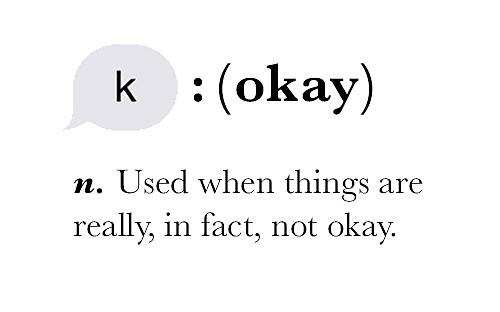brb, gonna read this. ttyl

Communication is a major part of any kind of relationship and it should not be
altered with acronyms that can be interpreted in various amounts of ways.
What’s the difference between “k” and “okay,” “sorry” and “I’m sorry”?
To some, the meaning remains the same and perhaps the few extra letters are
happily disregarded. After all, it is quicker and easier to read.
Except, what about when you are fighting over text with someone? Whether it’s a
lover, a friend, family member, etc. Is a texting acronym really the appropriate response
to an important conversation?
We made a list of responses we have received over text that irritate us and
possibly a majority of people with cellphones.
1. “K”
Getting a one-worded answer is bad enough. But, the most aggravating,
frustrating, and stupid response to anyone is a one-lettered response, “K.” Is it really
that hard to add an “O” to the “K”? And if you are feeling extra generous you can spell
the four-lettered word out entirely.
Stated by senior Isabella Ramina, “Getting ‘K’d is the worst. It’s like they don’t
care enough to write ‘okay’.”
2. “Sorry”
Does “sorry” ever make a difference whether it’s a fight with a significant other or
family member? It is one word against a hundred actions, the least that can be done is
fully typing a sentence that empathises your condolence. Or even better, pick up the
phone to truly show you care and apologize; some things are not meant to be done over
text.
3. “ily” or “imy”
How much do you truly love or miss that person you took 0.12 seconds to type
“imy” or “ily”? Nothing is more irritating and frustrating to get a text from a significant
other who seems to not care. Take the extra two seconds to fully type out “I miss you”
or “I love you” because trust me it will makes a girl’s day. Show the people that their
absence upsets you or they truly mean the world to you; that is not shown through a text
with three letters.
4. “Gn”
Let’s be honest, at least once in your life you have told someone you are going to
sleep and then continued to scroll through your Instagram or Twitter feed for an
additional twenty minutes. You must not be that tired if you can do that but not type out
an extra seven letters. Go the extra step and make the rest of someone’s night a little bit
better.
5. “Lol”
Lol. Are you actually laughing out loud? And if you are, then why state it so
blatantly? There are so many other ways to express what you may find hilarious, but still
some people continue to use the three-lettered word, “lol.” Understand this though, not
only does it mean that you are laughing, but it can also mean that you are extremely
pissed off. To avoid this confusion, simply say “I’m pissed.” It’s 100% more effective.
6. “wdym?”
What do you mean, “what do you mean”? Was I speaking Spanish?
Miscommunication frequently occurs while texting, but it is disappointing when someone
does not understand a text that the other person possibly spent five to ten minutes
preparing. Try rereading the text three times before bluntly saying “wdym?” and maybe
try a response that’s a little more friendly like, “I didn’t understand” or “Can you please
rephrase that?”
7. “Jc”
How is this supposed to lead to a further conversation? There is a very rare
chance that the person with the boring response is intentionally trying to distinguish the
conversation because if that were true, they most likely wouldn’t have taken the time to
text back in the first place. We suggest, on behalf of all people fed-up with words being
cut short over text, that you respond more thoroughly. Believe it or not if the person
asked you what’s up first, it’s most likely because they would actually like to know.
8. “Maybe”
The chances are, the person is looking for a definite “yes” or “no” and receiving
an uncertain response drives them crazy. Saying “maybe” is another way to avoid how
one truly feels or how one does not want to make definite plans. Be honest; honesty will
get you far in life, and simply give a “yes” or “no”. Also, communicate how you feel and
your thoughts without hiding them behind a one word response.
9. “I’m fine”
If you say you are fine, it’s an automatic assumption that you are the
complete opposite of fine. Some people do it to make it seem like there is something
wrong when there isn’t, and other times there is something wrong but the person
refuses to tell you. And then there is the very small chance that the person sending the
text is actually fine, but it’s extremely rare. If you’re fine then just use a different word
like “I’m good” or even “great.” Being content is a good thing so you might as well
express it happily.
Overall, if you’re having a conversation over text message, we suggest not using
acronyms to convey your feelings because it can lead to confusion and altered
interpretations.

I’m Ashley Lutz and a senior at West Morris Central. I took journalism for a second year because I enjoy writing and like the work environment. Elizabeth...

Hi! I am Elizabeth Jasek and I’m a senior here at West Morris Central. This is my second year taking Journalism, and I came back because I love the environment...


































